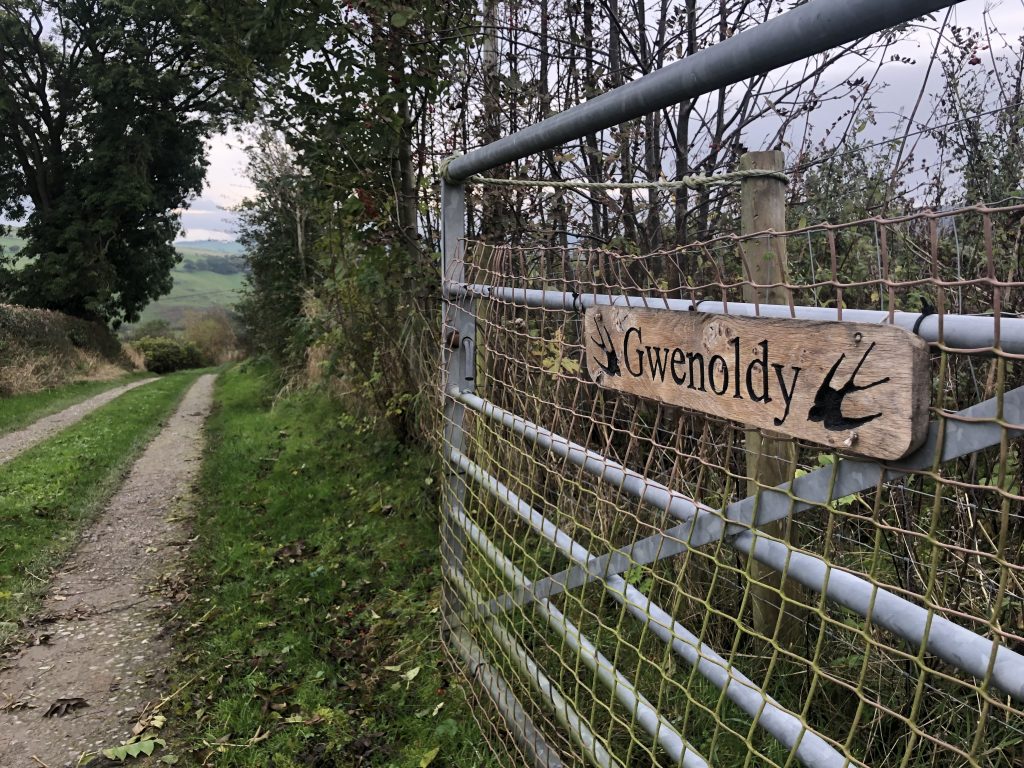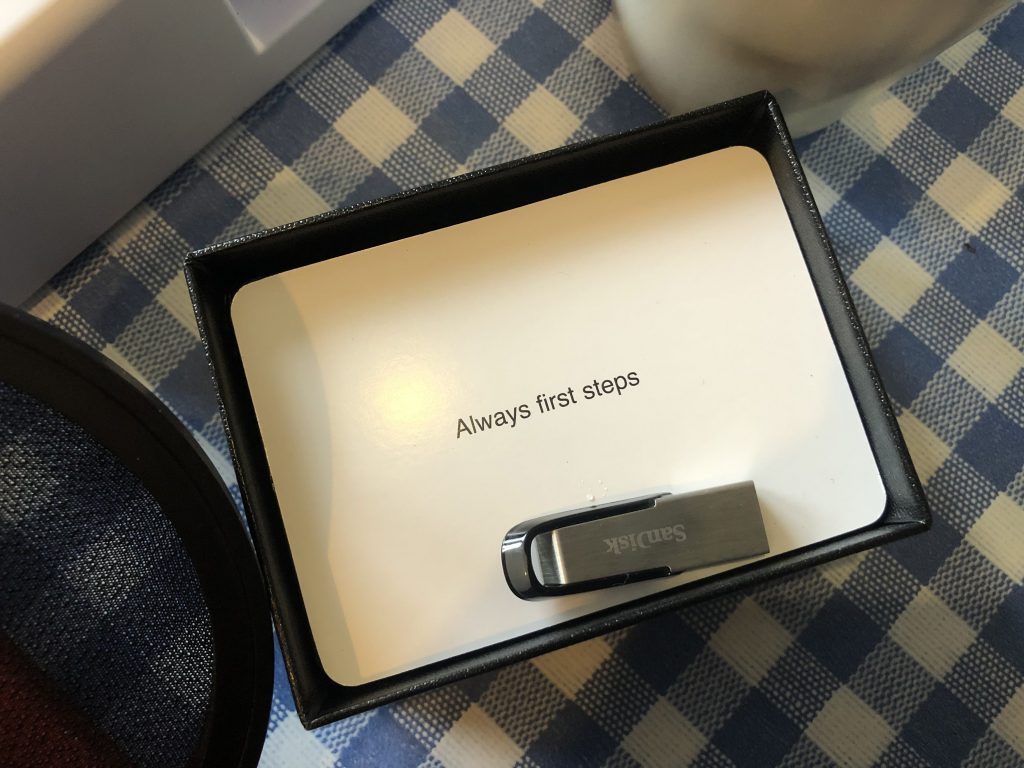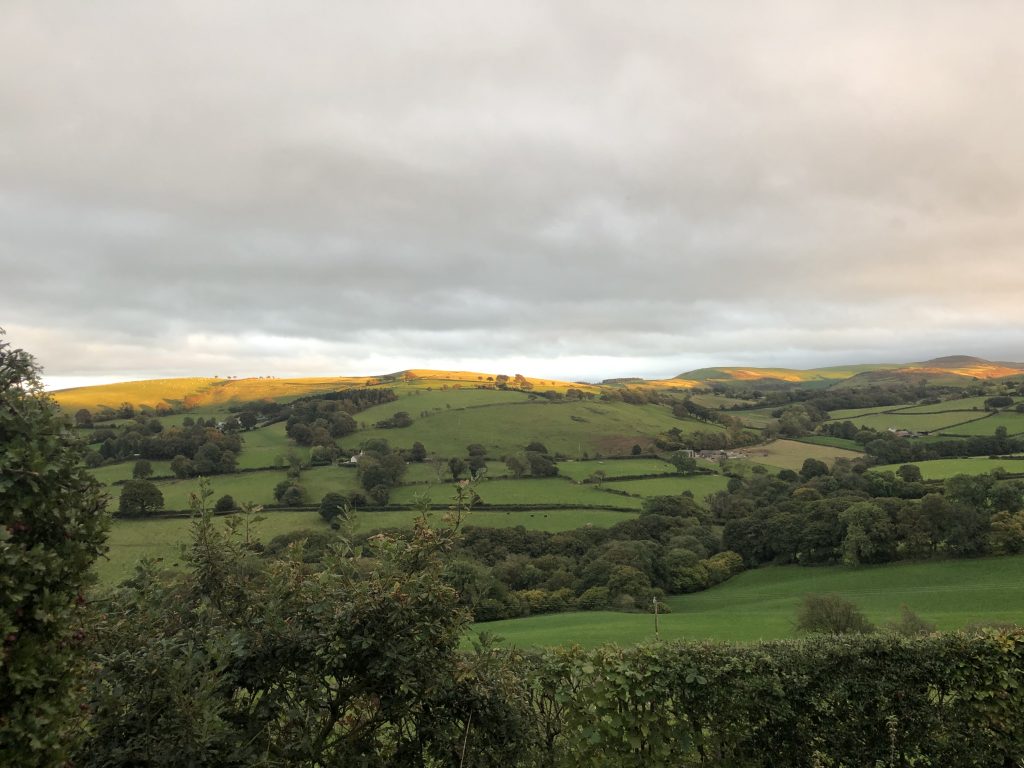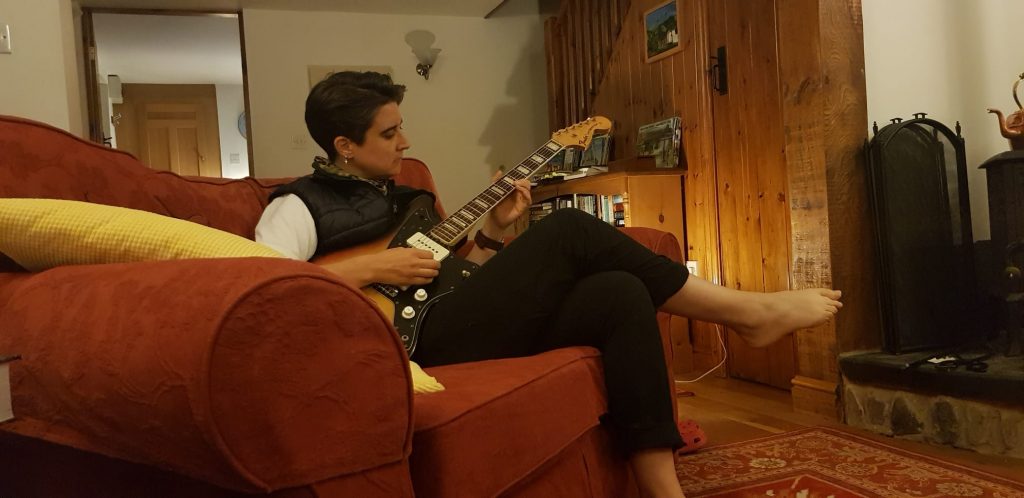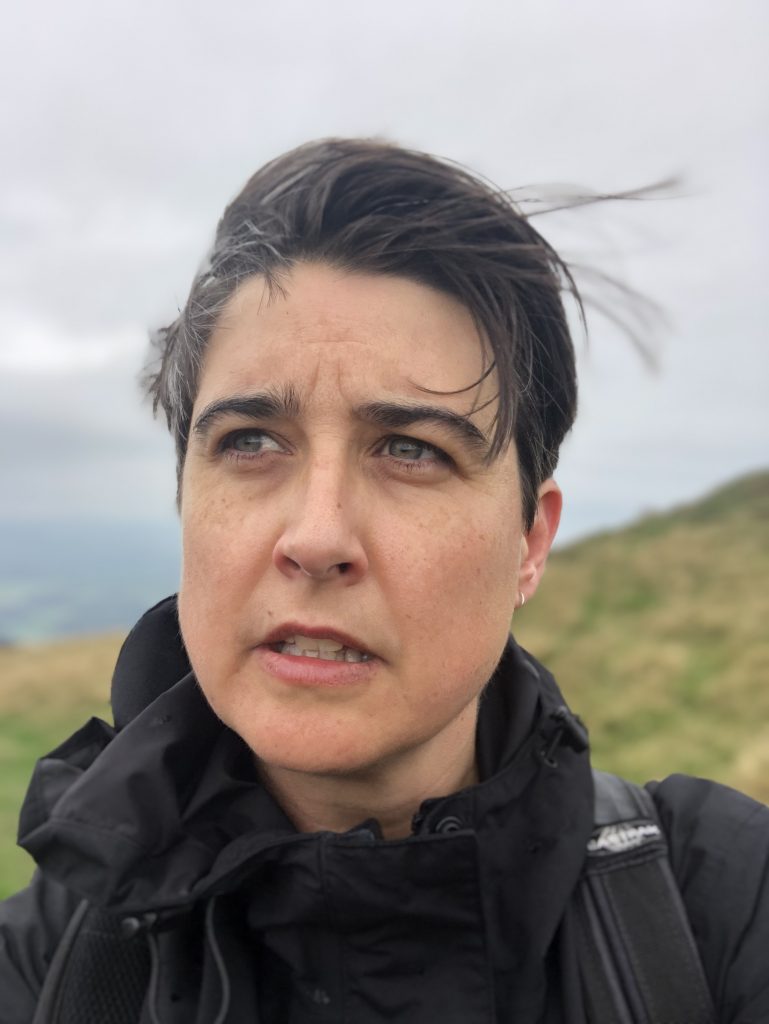I’m a musician (guitar/vocals); DJ; event and exhibition curator; and facilitator for a charity called Drake Music. In July 2019 I was lucky enough to receive a Developing Your Creative Practice Grant from Arts Council England. At that time, my interest in making music had been re-awakened after a period of around 15 dormant years, during which, to the detriment of my wellbeing, I had prioritised creating creative opportunities for others, whilst simply trying to find a way each month to pay the rent. A familiar story for many of artists I know.
My creative reawakening had been provoked by an unexpected invitation to join a cult Manchester band (dub sex) on rhythm guitar in a venture they were developing under a new name. I worked hard with this band for two years, until the singer, Mark Hoyle, developed life-altering tinnitus, and we wound up the project.
I began working on my own songs, and grew excited by the possibility of putting together my own band again. I really wanted to gig and record, and most of all, to connect with other musicians. This is where the DYCP came in. I applied, planning a period of reduced workload; some mentoring and collaboration with other musicians; and a string of performances.
Mauerstadt 30
My first was at an event called Mauerstadt 30, which I organised in partnership with Manchester Metropolitan University and HOMOBLOC (a massive LGBT+ music festival in Manchester, attracting crowds of 10,000 plus). The event was conceived as a way to mark the 30th anniversary of the fall of the Berlin wall. It would feature queer and trans performers; a Q&A with Mark Reeder (a Manc-born, Berlin based producer and label-owner); and a debut performance from me backed by session players, all held in the Pink Room at YES.
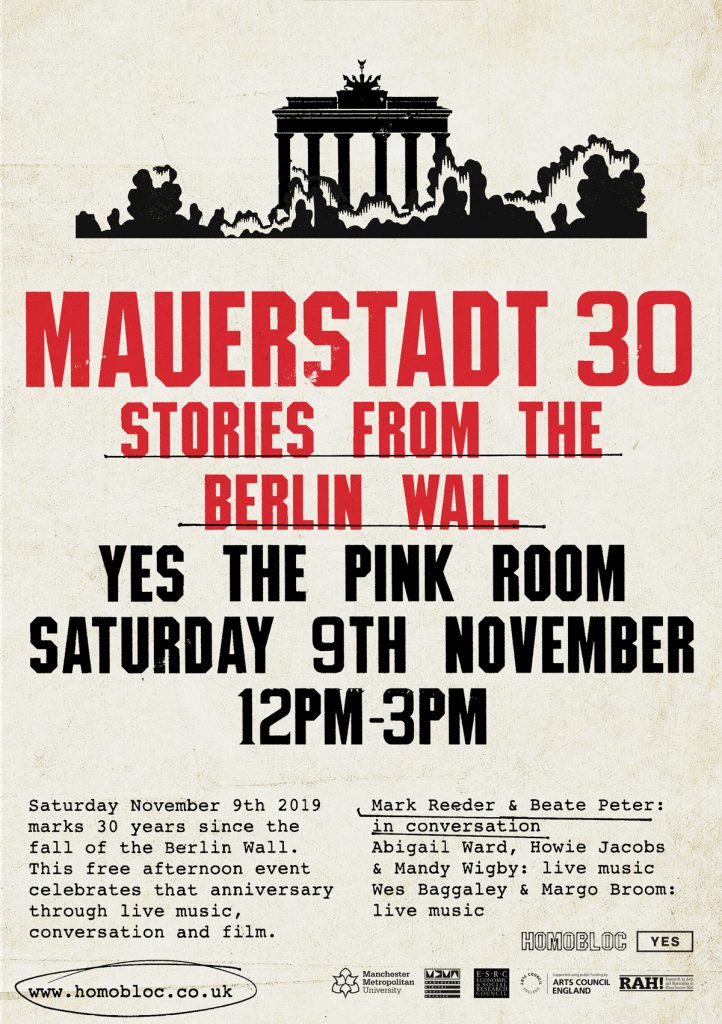
The event was complex to organise, with a number of different funders and stakeholders. Producing and promoting it became my main focus. I was looking after everything from artist and venue liaison to marketing, ticketing and fundraising. This proved overwhelming for me and allowed little time for me to focus and what I actually wanted to do: make music, experiment, rediscover a sense of play and delight in my creative practice.
In the weeks leading up to the event I began to experience very high levels of anxiety – a combination of extreme stage fright and the stress of keeping all the event management plates spinning.
I pushed myself hard to rehearse with session players and solo, sometimes finding myself in tears alone in the studio. On one occasion I fell asleep on the sofa in a rehearsal room, waking up hours later, no time left, without having even opened my guitar case.
I also undertook some vocal coaching and guitar lessons, but found myself feeling particularly anxious before and during these sessions.
The event itself was a great success. It was attended by 120 people. The Q&A with Mark Reeder was a particular highlight. It was a privilege to hear his stories of smuggling music and punk bands from West Berlin to East in the 80s.
I enjoyed my performance to an extent, but my abiding memory of the experience was one of stress and anxiety.
Little did I realise at the time that I was simply re-enacting an ancient cycle: allowing my perfectionism, both as an event producer and as a performer to push me into extreme overwork, over-preparation, and ultimately, overwhelm.
I put my guitar back in its case on the evening of November 9th 2019, and left it there for many months. I began to focus on my other work again, and every time I thought about the rest of my DYCP project, I experienced a feeling of panic and paralysis.
Coaching
I realised I need some coaching to help me assess what had happened, so used my DYCP to enlist the services of Teresa Wilson.
My sessions with Teresa were intense and enlightening. I discovered than in order for me to fulfil my dream of becoming an artist, I needed to make some space in my life for creativity. Easier said than done. Although it was a painful decision, I knew something had to give, so I resigned from my role with the charity I had co-founded in 2003, Manchester Digital Music Archive. This in itself provoked a mountain of work – extracting myself was far from easy – and I spent several months training others to take over my responsibilities. I also experienced a great sense of loss. I left the organisation with little to show for my 17 years of stewardship.
So, now, surely it was time to have some fun and make some music? You’d think so.
Pandemic
But during this period, Covid hit. Initially, following a few weeks of panic about my vulnerable loved ones, I experienced a deep sense of relief. My diary cleared. A freak heatwave occurred in Manchester. The streets were deserted. Quietness reigned. I could see my own burn-out and distress in sharp relief: I was living in an inner city area of Manchester, always struggling to make ends meet, in anxiety’s relentless grip.
But this conflicted moment of calm quickly faded. A kind of stasis set in. I was isolated from my life force: music. No live gigs, no clubbing, no DJing. And once again, the feelings of pressing anxiety about my DYCP began to surface.
I decided to begin a new phase of creative coaching – this time with Meg Fenwick.
The first short blast with Teresa Wilson has provoked a complete and much-needed change in my life. But now it was time to get down to the brass tacks of the problem – a lifelong struggle with shame and perfectionism that was standing in the way of my creativity.
The Artist’s Way
During this time I also took steps to reduce my isolation in other ways. I began a course called The Artist’s Way. This book is a well-known spiritual investigation of creativity and the causes of ‘writer’s block’.
I spoke to some fellow artists about my experiences and we decided to form a peer-to-peer Zoom coaching group – we committed to completing The Artist’s Way together. One of the best decisions I’ve ever made! The course itself was absolutely illuminating. I felt as though it had been created entirely for me. The writer, Julia Cameron, offers such profound companionship through her essays and creative tasks. In our group sessions we experienced a deep connection, in spite of the pandemic – a connection that cut across disciplines (our group was made up of a film maker, a photographer, a jewellery maker and me) and geography. It floored us all and we often spoke about how our challenges and internal lives as artists were incredibly similar, despite our practices being different.
As part of The Artist’s Way, I began the practice of writing the Morning Pages – a stream of consciousness longhand journal to be completed on a daily basis. Alongside my pre-existing practice of meditation this habit became the cornerstone of a healthier relationship with creativity – one that prioritised fun, openness, spontaneity and experimentation. It helped me to exist in a state of curiosity rather than perfectionism and shame. No one would ever read these words, so what the fuck?
Through my Morning Pages, my group work and my creative coaching I began to experience healing and a sense of possibility again.
I began to draw (for the first time since I was a child) as a way of relaxing and creating a conducive, non-judgemental mindset. Alongside many drawings I have also written around 15 pieces of prose poetry and around another 15 song lyrics using the Morning Pages process.
I was now starting to feel like tentatively re-engaging with music again, but lockdown conditions were making things hard. I managed a few solo rehearsals and some distanced sit-down DJ gigs. But the lack of live music in my life was making me feel unmoored.
Creating my studio
Around this time, I was given an interesting, bittersweet gift. A friend of mine had passed away, and following his death I was given his mixing desk and two Korg synths from the mid-1990s. I came up with the idea of a kind of posthumous collaboration – I would make some tracks using the beats and riffs that my friend has left programmed into the synths.
Whilst that plan hasn’t quite worked out (yet!), the idea kicked off a new phase of learning for me. Since the pandemic had scuppered my plans to record in a studio with a band, I might as well get on with building my own.
I began some remote music production sessions with Logic Pro X tutor Neil Scott. I already had experience using Logic Pro X for editing radio and podcasts. Now I was learning more about how to input sound and use MIDI. The Korgs were particularly tricky customers! My tutor gently explained that I was making life harder for myself by using ancient ’90s hardware. But that’s what I love doing: making life hard for myself.
Around this same time I began a new phase of my work for Drake Music. Greatly aided by The Artist’s Way/DYCP, I succeeded in making the transition from project manager/producer to Creative Facilitator. I started a project with three Disabled artists in residence. The work was very complex, involving a complete switch to remote working, due to the pandemic. This threw up many challenges, from management of ever-evolving and conflicting access requirements, to making music together remotely.
I found this work intense and consuming, but kept up my creative coaching and sporadic forays into Logic Pro X.
Creative retreat
But as the months went by it was apparent that I was still struggling to unleash my creative spirit. Following my first bout of Covid, which took over a month to recover from, I decided to use my grant to book a creative retreat for myself. I found an AirBnB in Wales in which I set up a rudimentary studio and spent 4 days writing and producing music, very much aided by the stunning scenery and a series of beautiful walks.
This retreat felt like a breakthrough. Making music in Logic with a MIDI keyboard was starting feel natural, and dare I say it, fun! I am not a keyboard player and this fact seemed to greatly reduce the pressure I was putting on myself to be ‘perfect’. Anything I could get out of the keyboard came as a pleasant surprise.
I created a track called Gwenoldy, named after my Welsh retreat. It was inspired by a dusk walk to a nearby radio transmitter. This music was sounding very different to my work as a singer/songwriter. I was evolving into an electronic music producer.
I also wrote some words for the piece, as yet unused.
Upon my return home I worked with ambient/dub techno producer J.S. Zeiter on a finished production of the track. The goal was to play it out at my biggest DJ gig to date: HOMOBLOC. This would neatly bookend my DYCP: I started it at Homobloc 2019, as a singer/songwriter, and was close to finishing it at Homobloc 2021 as a DJ/electronic music producer.
On November 6th I performed my DJ set (albeit in a state extreme nerves and anxiety) and debuted my new track to a receptive dancefloor. A big deal!
Music machine
I continued with my Logic tutoring with Neil Scott, and we devised a method of working aimed at helping me to be more prolific and less finicky. The model drew inspiration from Mike Monday’s Automatic Music Machine and the book Atomic Habits by James Clear. I created 25 rapid-fire musical sketches over the next few months.
Some of these I am currently developing in to finished tracks. The final part of my grant will be spent on working with a producer to mix and master a selection of these in readiness for self-release on Bandcamp. A local record label – Red Laser Records, has expressed an interest in releasing one of the tracks on vinyl, which would be a dream come true.
There is still some distance to go before I will feel ready to unleash this music, but the I am working through the steps I need to go through to make this happen, and look forward to sharing the result with ACE.
Neurodiversity
Covid forced me to abandon my original plan of gigging, recording in a studio and collaborating with other musicians. But the result of this was that I undertook some deep, life-changing work which has help me to understand how to set my creativity free, whilst simultaneously keeping an eye on my well-being and energy levels.
On the subject of well-being, perhaps the biggest overall outcome of my DYCP grant has been the realisation that I am neurodivergent. Whilst this is something I may have always known on some unconscious level, I have struggled truly to come to terms with this issue, or share my difficulties with anyone.
The realisation came about through a combination of things: my two periods of creative coaching, my work as a facilitator for neurodivergent artists and a number of higher profile DJ performances that left me in a state of exhaustion and overwhelm.
I began to see that I had been fighting hard for ND artists to be understood, whilst completely ignoring my own access requirements. This is known as masking.
I began to see a pattern: I had a strong urge to perform, both as a musician and a DJ, but as the gigs got bigger (Homobloc, Manchester International Festival, Manchester Psyche Fest) I struggled more and more with crippling anxiety and sensory overwhelm.
Because of this, I have decided to take a break from performing music, both as musician & as a DJ, in favour of placing greater emphasis on producing electronic music and podcasts. I am not ruling it out for the future, but I need to spend more time understanding how I can do it safely. I feel this is a big piece of work in its own right.
Key outputs
- A gig at YES, Manchester, as part of HOMOBLOC festival, attended by 120 people
- 20 coaching sessions with Meg Fenwick
- 7 coaching sessions with Teresa Wilson
- 4 vocal coaching sessions
- 3 Guitar Lessons
- 1 mixed and mastered track, played out at HOMOBLOC
- 25 song sketches
- 30 pieces of lyric-writing / prose poetry
- 1 Logic Pro X session with Raz Ullah
- 4 Logic Pro X sessions with Neil Scott
- A new home studio
- A new website
Key achievements
- Performing new material, both as a DJ/producer AND as a singer/songwriter
- Becoming more proficient in Logic Pro X and MIDI hardware
- Playing keys for the first time in my music practice
- Producing 25 demos, from which an EP will be released on Bandcamp in autumn
- Becoming a Creative Facilitator for Drake Music
- Completing The Artist’s Way
- Devising a working model based on The Automatic Music Machine
- Staying healthy
